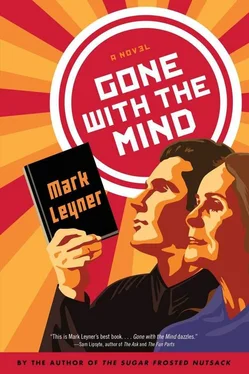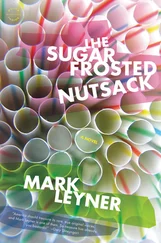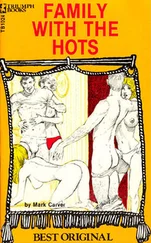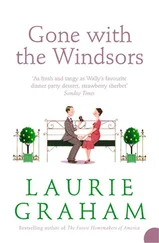P.S. When I think back now to Eli’s drab, cinder-block dorm room at Tufts, I see a third presence of whom I was unaware when I was actually present there forty years ago. And now the presence persistently haunts this memory…a kind of spectral roommate to whom I was oblivious in the empirically verifiable “real world”…a small, round young man with waxy, translucent skin who sat motionless on the edge of his tautly made bed, staring mutely out into space, like a piece of bric-a-brac on a shelf, like a tutelary deity in the bardo world…whose one eye, when I think about it now, was like an aperture into another world…
I finally asked the Imaginary Intern — I think this was about a week or so before he left for good — what exactly he found so moving about that conversation with my father about the cell-phone service in the caves, and he said that sometimes an aging father just doesn’t want to argue or have even the mildest disagreement with his son, he just wants everything to feel amiable and copacetic, and if you’re being sort of flip and sarcastic, just trying to goad him, and you say something like…and I’m just making this up off the top of my head…something like… “Y’know, Dad, Saint Angela of Foligno drank water contaminated by the putrefying flesh of lepers. Catherine of Siena occasionally sipped pus from cancerous sores. But a Jew? A Jew would never drink putrefying leper-water or sip pus from a cancerous sore. Never happen. Trust me on that. So if we’re just talking about the dramaturgy of self-mortification, you’d have to say that Catholicism is, like, light-years ahead of Judaism.” And the aging father, who’s sort of half listening at this point, will simply say something very anodyne in response, something very conciliatory, something like “You’re probably right.” And the Imaginary Intern said, “I just think that’s very sweet…again, I just find that to be very poignant…Because it’s about someone who just wants to be loving.”
This was a side of the Imaginary Intern that you could very easily forget, because he was capable of saying things that were so…what’s a good word, uh…so puerile . Well, they would seem puerile at first and then later — sometimes much, much later — you’d realize that they weren’t puerile at all. He used to always talk about going to a place called Studio Mizuhō, and I just assumed that it was some kind of bar or club or hair salon or something, but I’ve realized since he left — because I tend to rehash a lot of things he said to me over and over in my head — that Studio Mizuhō is not a place at all, it’s a state of heightened awareness and cognition, a state of…of optimized neuroplasticity, memory, focus, computation, analytical ability…a capacity for deep abstraction. So “Let’s go to Studio Mizuhō” is really an invitation to sort of jack into this kind of transcendent cognitive nexus where you have, like, total recall and the ability to analyze hundreds of millions of moves per second. But he’d also call this state “Around the Corner Where Fudge Is Made,” which is from some silly, scatological rhyme he liked, but it doesn’t seem silly or scatological to me at all anymore. It describes to me now a certain specific state of rapture, the state of ecstasy in its original Greek meaning— ekstasis, a displacement, a state of being beside one’s self or rapt out of one’s self. And I use the term at the end of the autobiography — and I’m a little worried that this is something people might not completely get or might misconstrue entirely — when Mussolini comes and picks me up at the mall in the flying balcony, and he asks me where I want to go, I say, “Around the corner where fudge is made.” And I don’t mean by that up into my self. I mean exactly the opposite. I mean that I want to be taken out of my self. It describes a way out…as I said, a way out for the mind.
He also used to say — the Imaginary Intern — this funny thing…whenever we’d disagree about something, he’d say, “Let’s get our stories straight before the cops get here.” Which I just thought was completely adorable. And he’d always point out things to me he knew I loved…We’d be walking down the street, and he’d be like, “Wimpled nuns at ten o’clock”…
It’s still a hard thing for me to talk about sometimes, still a painful thing…
Y’know, it will be exactly three years ago this coming Saturday that, sitting on the toilet, I looked down at a pattern of cracks in the tile on my bathroom floor and conjured him up, and almost immediately asked him how he’d feel about collaborating with me on a book about the hedonism of suffering. “How would I feel?” he replied — and I remember this as clearly as if it happened yesterday — he said, “I’m feelin’ like a mogul / hittin’ jackpots on my mobile,” which is a line from a TV ad for online gambling in New Jersey. This was just the way he expressed himself sometimes, in a kind of code or through citations like that.
I mean, he was very enigmatic, which is probably pretty par for the course for a paracosmic entity, but he was also, I think, just very sensitive and very shy. There was a show on Nickelodeon that we watched together once called Victorious, and one of the characters was this kid Robbie who had a puppet named Rex, and Robbie did this whole ventriloquist thing…he was a shy kid and the puppet had this brash, sassy personality…and so it enabled Robbie to express himself in ways that he couldn’t on his own. And I could see that the show made the Imaginary Intern really uncomfortable. And I couldn’t for the life of me figure out why, and I’d even tease him about it and suggest we binge-watch all four seasons…until I realized that it was really bothering him. But I never got an opportunity to sit down and talk to him about it…He left…and…we just never had a chance to…I’m not going to get into all that again, but…Y’know…I could get impatient with him…exasperated sometimes…and I never realized back then that his aversion to the show, which was ostensibly about the acting and the writing, was…I don’t know…veiled or displaced…that it really was a sensitivity about playing the role of the ventriloquist’s dummy in our relationship…And my failure to discern that, to acknowledge his insecurities about his own autonomy — something he was far too proud to ever broach explicitly — it pains me still…because I never thought of our relationship in that way, ever . The fact is that the Imaginary Intern frequently said things to me, cryptic, puzzling things, that I simply could not have put in his mouth…things I couldn’t even fully comprehend at the time he uttered them to me. For instance, once he said: “Autobiography is the Auschwitz of psycholinguistics.” Not in those exact words of course, but that was basically the gist of what he said. And for a long time I tried to work through what that might actually mean. And in the end I think this may be the complete opposite of what I was talking about before. This may actually be something that turned out to be completely specious, that seemed to be abstruse and profound at first, but then turned out to be completely puerile. But I don’t care…I still love it.
There are enigmas that we can gnaw on throughout our lives from which we derive sustenance, some kind of spiritual nourishment…I’m thinking of certain kinds of riddles and koans and philosophical conundrums, things like that…But there are also enigmas that, throughout our lives, gnaw on us.
At my bar mitzvah in 1969 (the day before the Jets defeated the Baltimore Colts in the Super Bowl, the game Broadway Joe Namath notoriously predicted the underdog Jets would win), toward the end of the ceremony, the rabbi leaned over and whispered something in my ear. This is something I’d seen him do at each of my friends’ bar mitzvahs, and I’d asked them what he said, and it was usually a version of what you might call “words of wisdom”—sometimes a bit platitudinous, but other times, very specific to the boy and his idiosyncrasies and predilections and, in my thirteen-year-old opinion, extremely wise and pertinent, and, again, in my callow opinion (and boys that age do tend to overdramatize and over-romanticize things), perhaps even constituting the essential key to life. And I had a great deal of respect for this rabbi — he was a very personable guy who’d written a highly regarded book about the kabbalah, and I was actually anticipating with avid interest what he was going to whisper to me. I should add here that, for my bar mitzvah, I was wearing this ridiculous multicolor brocade Nehru jacket that my mom had picked out for me…Do you remember that jacket?
Читать дальше












